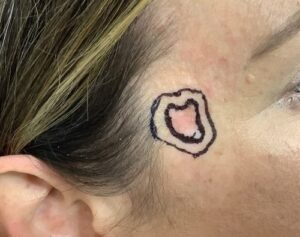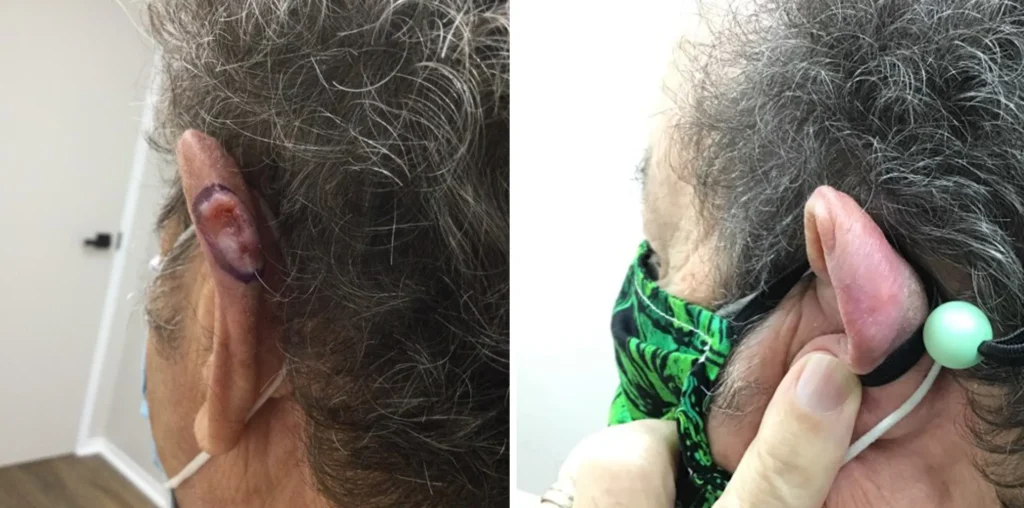
Nodular basal cell skin cancer is one of the most common types of basal cell skin cancer and often appears as a pearly bump that refuses to go away. Is nodular basal cell skin cancer dangerous, and can it spread? Explore this overview on what to expect from a nodular basal cell skin cancer prognosis.
What Does Early Nodular Basal Cell Skin Cancer Look Like?
Millions of Americans receive a skin cancer diagnosis every year. According to the American Cancer Society, about 8 out of 10 of these are basal cell cancers. Within that group, about 60%-70% will receive a nodular basal cell skin cancer diagnosis.
Nodular basal cell skin cancer will often present as a small, pearly bump that may be pink or translucent. Over time, this lesion will continue to grow and may even break open, bleed, and scab over without ever fully healing.
The early signs of nodular basal cell skin cancer can vary slightly from person to person, but most begin as firm, dome-shaped growths that may be confused with acne or harmless cysts. In many cases, patients report noticing persistent pink or skin-toned bumps that slowly enlarge over time.
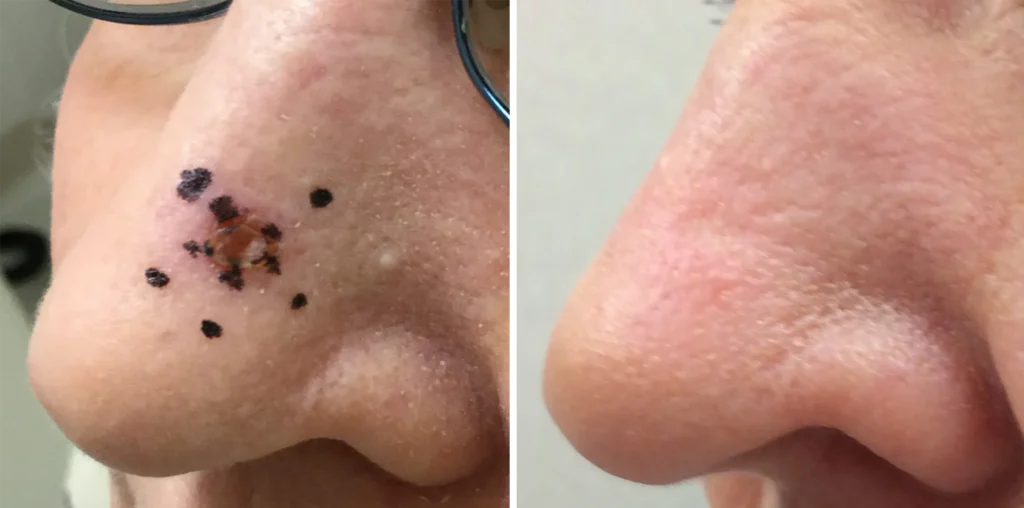
These growths are often most visible on the face or scalp. If you’ve seen pictures of nodular basal cell skin cancer, you’ll recognize its distinct smooth, shiny appearance—especially under direct light.
Is Nodular Basal Cell Skin Cancer Dangerous?
Skin cancer is one of the most treatable forms of cancer. The ability to see the cancer developing externally makes the disease easier to combat, compared to internal illnesses that do not come with visual warning signs. When detected early, nodular basal cell skin cancer has an excellent prognosis and survival rate — up to 100% if it hasn’t spread.
That being said, nodular basal cell skin cancer can be dangerous if symptoms are ignored or treatment is delayed. Cancer development is categorized into five different stages ranging from zero to four, and the higher the stage, the more dangerous the disease becomes.
At stage four, basal cell skin cancer is referred to as metastatic or advanced, which means it has spread to other areas of the body. In these rare cases, death is estimated to occur within 8-14 months from the date of the diagnosis. Scheduling an annual skin cancer screening is a smart way to monitor changes to your skin and seek treatment as soon as cancerous cells are detected.
Because nodular basal cell skin cancer tends to grow slowly, many people assume it’s harmless. But without treatment, it can infiltrate deeper layers of tissue, especially on delicate areas like the nose or eyelid.
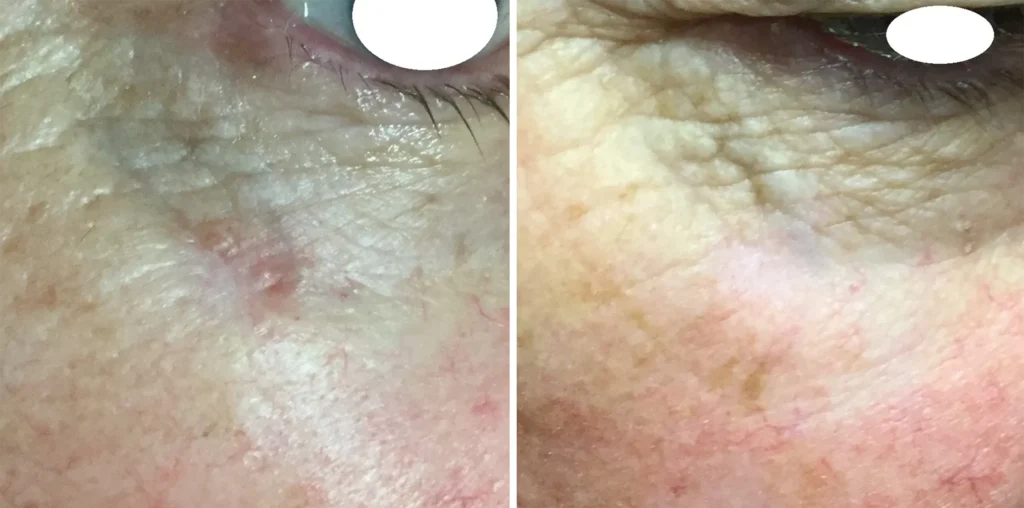
Can Nodular Basal Cell Skin Cancer Spread?
Nodular basal cell skin cancer is unlikely to spread, as these specific tumors grow very slowly (about 1 centimeter a year) and usually stay restricted to the skin. However, depending on the placement of your nodular basal cell skin cancer, the growing tumor may have detrimental effects on nearby body parts, especially if one develops near your:
- Eyes
- Ears
- Mouth
- Bone
- Brain
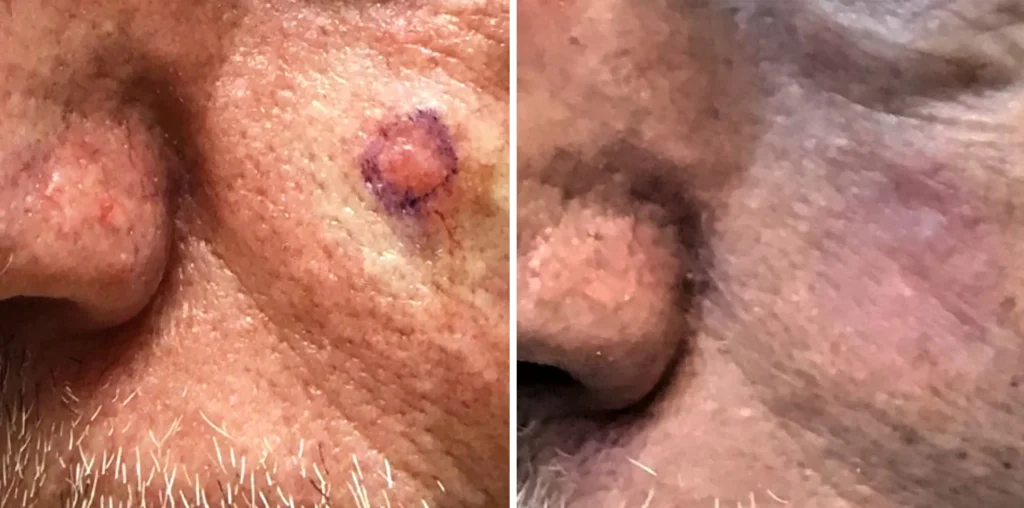
Though the risk of metastasis is low, the tumor’s location plays a critical role in how it affects your health. Growth near sensitive structures can cause tissue damage or disfigurement if left untreated. That’s why early diagnosis and intervention matter.
How GentleCure Helps You Understand Treatment for Nodular Basal Cell Skin Cancer
The commonality of nodular basal cell skin cancer means that patients have treatment options. If you’re seeking a surgery-free common skin cancer treatment, GentleCure™ may be able to help. To learn more, contact us online or call our skin cancer information specialists at 855-936-4411 today.
Nodular BCC treatment options range from surgical procedures like Mohs surgery to surgery-free methods such as Image-Guided Superficial Radiotherapy (IG-SRT). This newer approach offers effective results without scarring, making it a preferred option for many patients.




